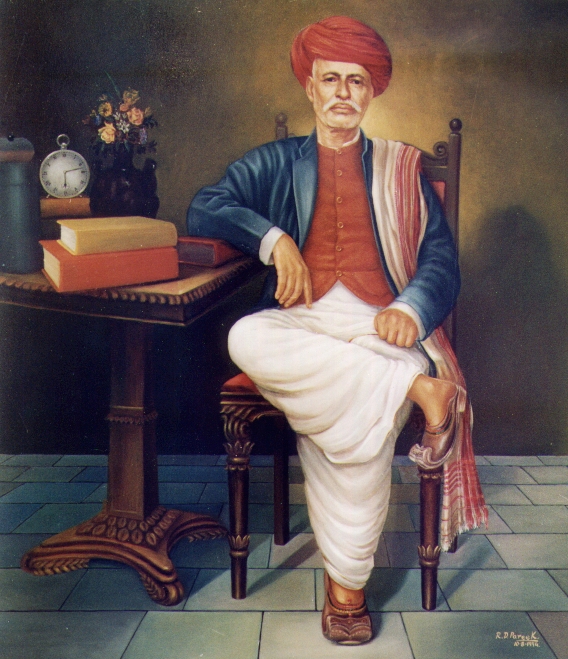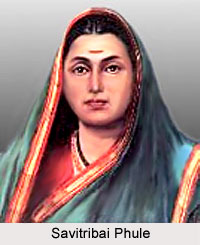
Mahatma Jyotirao Phule
In India, Maharashtra a state with cultural heritage and is also land of social thinkers, social reforms and social revolutionaries who have not only molded and enriched all facets of life of Maharashtra but have also made singular contribution to growth and development of India In this website of the great social reformer - Mahatma Phule, contempory of KARL MARX, we have the 'patria protesta' of the Indian social revolution and the first leader of peasants. In those days there was a conflict between the rationalist and the orthodox His period can, therefore, be a aptly described as the dawn of revolution in the history not only of Maharashtra but of the country as a whole in the various fields like Education, Caste Systems, Agriculture, Economics, Women and widow upliftment , Human Rights, Untouchability ,Social Equality
In India, Maharashtra a state with cultural heritage and is also land of social thinkers, social reforms and social revolutionaries who have not only molded and enriched all facets of life of Maharashtra but have also made singular contribution to growth and development of India . In this website of the great social reformer Mahatma Phule, contempory of KARL MARX, we have the 'patria protesta' of the Indian social revolution and the first leader of peasants. In those days there was a conflict between the rationalist and the orthodox. His period can, therefore, be a aptly described as the dawn of revolution in the history not only of Maharashtra but of the country as a whole in the various fields like Education, Caste Systems, Agriculture, Economics, Women and widow upliftment , Human Rights, Untouchability ,Social Equality.
MAHATMA JYOTIRAO GOVINDRAO PHULE occupies a unique position among the social reformers of Maharashtra in the nineteenth century. While other reformers concentrated more on reforming the social institutions of family and marriage with special emphasis on the status and rights of women, Jyotirao Phule revolted against the unjust caste system under which million of people had suffered for centuries. In particular, he courageously upheld the cause of the untouchables and took up the cudgels for the poorer peasants. He was a militant advocate of their rights The story of his stormy life is an inspiring saga of a continuous struggle which he waged relentlessly against the forces of reaction. What was remarkable was his ability to stand up against all kinds of pressure without faltering even once and act always according to his convictions Though some keen observers of the social scene in Maharashtra like Narayan Mahadeo Parmanand did acknowledge his greatness in his lifetime, it is only in recent decades that there is increasing appreciation of his service and sacrifice in uplifting the masses.

Savitribai Phule
Savitribai Jyotirao Phule (3 January 1831 : 10 March 1897) was an Indian social reformer and poet. Along with her husband, Jyotirao Phule, she played an important role in improving women's rights in India during British rule. The couple founded the first women's school at Bhide Wada in Pune in 1848.She also worked to abolish discrimination and unfair treatment of people based on caste and gender. Savitribai Phule was born in 1831 in Naigaon, Maharashtra. Her family were farmers.At the age of nine, she was married to twelve-year-old Jyotirao Phule in 1840.Savitribai and Jyotirao had no children of their own. However, the couple adopted Yashavantrao, who was the son of a widowed Brahmin. Savitribai worked as both an educational reformer and social reformer, especially for women. During the 19th century, arranged marriages before the age of maturity was the norm in the Hindu society of Maharashtra. Since mortality rates were high, many young girls often became widows even before attaining maturity. Due to social and cultural practices of the times, widow remarriage was out of question and therefore prospects for the young widows were poor. The 1881 Kolhapur gazetteer records that widows at that time used to shave their heads, and wear simple red saris and had to lead a very austere life with little joy.Savitribai and Jyotirao were moved by the plight of these girls. They organized a strike against the barbers to persuade them to stop shaving the heads of widows.
Also, these helpless women, with no way to refuse this treatment, were easy prey for rape, often by male members of the extended family. Widows who became pregnant would resort to suicide or killing the newborn for fear of being ostracized by the society.Once, Jyotirao stopped a pregnant lady from committing suicide, promising her to give her child his name after it was born. Savitribai accepted the lady in her house and helped her deliver the child. Savitribai and Jyotirao later adopted this child and named him Yashavantrao. He grew up to become a doctor. Savitribai and her husband established a center for caring for pregnant rape victims and delivering their children. The care center was called "Balhatya Pratibandhak Griha ". Savitri ran the home and considered all the children born in the home her own.
Moved by the treatment of the untouchables, who were refused drinking water meant for the upper caste, the Phule couple opened the well in their own house in 1868 for these communities . Tiffany Wayne has described Phule as one of the first-generation modern Indian feminists, and an important contributor to world feminism in general, as she was both addressing and challenging not simply the question of gender in isolation but also issues related to caste and casteist patriarchy." Savitribai Phule and her adopted son, Yashwant, opened a clinic to treat those affected by the worldwide Third Pandemic of the bubonic plague when it appeared in the area around Pune in 1897. The clinic was established at Sasane Mala, Hadapsar, near Pune, but out of the city in an area free of infection. Savitribai personally took patients to the clinic where her son treated them. While caring for the patients, she contracted the disease herself. She died from it on 10 March 1897 while serving a plague patient.